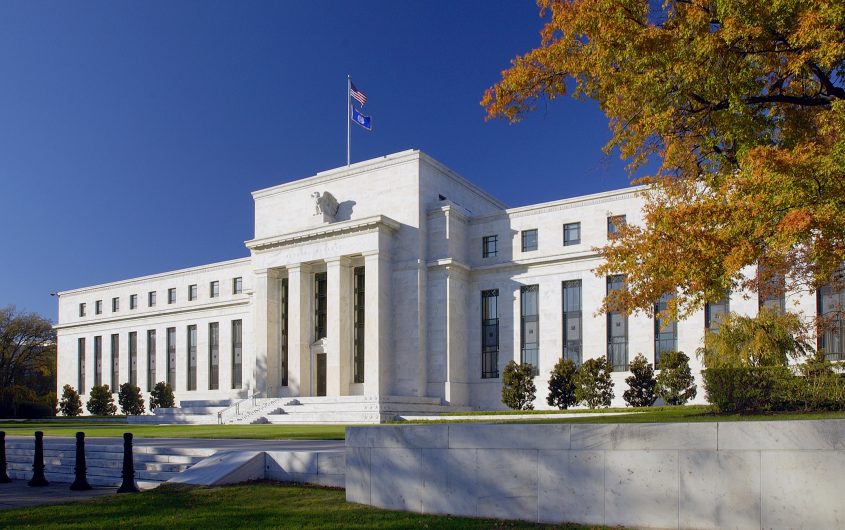
U.S. Federal Reserve via Flickr
Deepening the Transatlantic Dialogue on Financial Regulation
Lisa Kastner
Foundation for European Progressive Studies
Lisa Kastner is a policy advisor at the Foundation for European Progressive Studies, a Brussels-based think tank, and associate fellow at the Centre d’études européennes at Sciences Po Paris. She holds a PhD in political science from Sciences Po Paris and an MA in European Studies from the University of Bath. Lisa was a visiting fellow at the Max Planck Institute for the Study of Societies in Cologne, the Elliott School at George Washington University in Washington, DC, and at AICGS.
Her research on the politics of financial regulation has been awarded the research award in the category PhD thesis by the Erasmus academic network on Parliamentary Democracy in Europe (PADEMIA) in 2016, the journal article prize of the Max Planck Institute in 2015 and the Otto Hahn Medal of the Max Planck Society. Her work has appeared in the Journal of Common Market Studies, the Journal of European Public Policy (both forthcoming 2017), the Journal of Civil Society and in several policy outlets. Her book “Civil Society and Financial Regulation” will be published with Routledge in 2018.
She is a 2017-2018 participant in AICGS’ project “A German-American Dialogue of the Next Generation: Global Responsibility, Joint Engagement,” sponsored by the Transatlantik-Programm der Bundesrepublik Deutschland aus Mitteln des European Recovery Program (ERP) des Bundesministeriums für Wirtschaft und Energie (BMWi).
Are Our Financial Systems Sound and Stable?
Since the reform overhauls following the crisis in 2008, experts have agonized about the question whether financial systems across the Atlantic are sound enough to prevent another financial crisis. One camp, including Eric Helleiner, professor and member of the Warwick Commission on International Financial Regulation set up in 2009 to reform banking regulation, talks about the “Status Quo Crisis.”[1] The term highlights the fact that there has been very little change despite the massive shock the financial crisis had caused. According to Helleiner, there were, surprisingly enough, no “Bretton Woods moments” that established in 1944 the postwar international financial order. Other examples include the G20 summits that were not rising to the expectations, the unchallenged status of the U.S. dollar as the world’s dominant international currency, or the inherently market-friendly nature of international financial regulation that hasn’t fundamentally changed. Given the incremental nature of reforms, adherents to this viewpoint predict that there will soon be another financial meltdown.
The other camp, including policymakers on both sides of the Atlantic, has been trying to reassure us that the international financial system is sound and stable. Only recently, the Financial Stability Board (FSB) declared that “toxic forms of shadow banking” are being eliminated. When in June 2017 all U.S. banks passed the U.S. Federal Reserve’s annual stress test, the Fed chair suggested we might not experience another financial crisis “in our lifetimes.” Similarly, on its website, the European Commission reassures citizens that past reforms “have made the financial system more stable and resilient.”
Although the FSB describes the financial system as “safer, simpler and fairer,” it also acknowledges “risks that, if left unchecked, could undermine sustainable and balanced growth.” A major problem is, indeed, that risks have morphed—and migrated out of the banking system, where certain activities continue to exist under much less regulatory scrutiny. Banks are also still too big, too interconnected, and too undercapitalized, as a former City minister recently admitted. That is not to say there have not been changes. The regulatory system discredited by the crisis has been overhauled in the U.S. and the EU, but as the European Commission acknowledges, there is a need to “address the remaining risks and to keep the regulatory framework up to speed with technological and economic developments.”
An Ongoing Transatlantic Commitment is Needed
Some efforts have been undertaken to upgrade U.S.-EU financial regulatory cooperation since the crisis. The “Joint U.S. EU Financial Regulatory Forum” now serves as a bilateral channel to deepen the existing U.S.-EU Financial Markets Regulatory Dialogue that would ideally allow identifying potential problems at an earlier stage of the regulatory process. The Forum consists of senior-level meetings involving EU and U.S. regulators twice a year, alternately in Brussels and Washington, DC, as well as one meeting per year between the Commissioner for Financial Stability, Financial Services, and Capital Markets Union and the U.S. Secretary for the Treasury. As long as financial systems are subject to boom and bust cycles, close regulatory cooperation across the Atlantic is necessary to oversee increasingly interdependent financial markets, to reduce the risk of regulatory arbitrage, and to ensure that banks are “international in life but national in death.” An ongoing commitment to the dialogue on both sides of the Atlantic is key to develop effective regulatory solutions for the financial services industry.
The next Financial Regulatory Forum will take place in Brussels in summer 2018.
[1] Helleiner, Eric. 2014. The Status Quo Crisis. Global Financial Governance after the 2008 Meltdown. Oxford: Oxford University Press.








